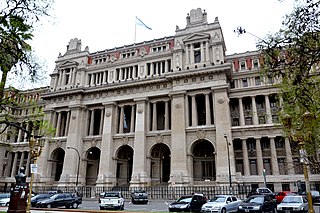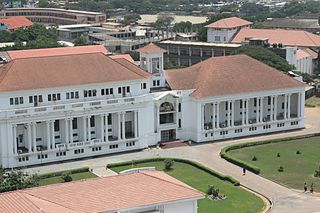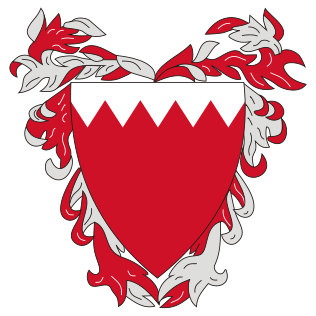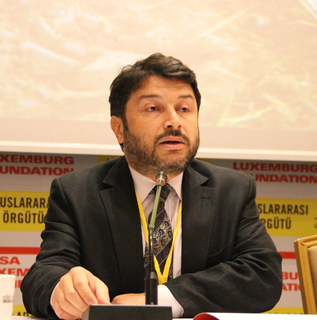Related Research Articles

Benin, officially the Republic of Benin and formerly known as Dahomey, is a country in West Africa. It is bordered by Togo to the west, Nigeria to the east, Burkina Faso to the north-west, and Niger to the north-east. The majority of its population lives on the small southern coastline of the Bight of Benin, part of the Gulf of Guinea in the northernmost tropical portion of the Atlantic Ocean. The capital of Benin is Porto-Novo, but the seat of government is in Cotonou, the country's largest city and economic capital. Benin covers an area of 114,763 square kilometres (44,310 sq mi) and its population in 2018 was estimated to be approximately 11.49 million. Benin is a tropical nation, highly dependent on agriculture, and is a large exporter of cotton and palm oil. Substantial employment and income arise from subsistence farming.

The Politics of Benin take place in the framework of a presidential representative democratic republic, wherein the President of Benin is both head of state and head of government, and of a multi-party system. Executive power is exercised by the government. Legislative power is vested in both the government and the legislature. The Judiciary is independent of the executive and the legislature. The current political system is derived from the 1990 Constitution of Benin and the subsequent transition to democracy in 1991. The Economist Intelligence Unit rated Benin a "hybrid regime" in 2019.
A pardon is a government decision to allow a person to be relieved of some or all of the legal consequences resulting from a criminal conviction. A pardon may be granted before or after conviction for the crime, depending on the laws of the jurisdiction.

Boniface Alexandre is a Haitian politician. Alexandre served as the provisional President of Haiti following the 2004 Haitian coup d'état until May 2006.

The Supreme Court of Argentina, officially known as the Supreme Court of Justice of the Argentine Nation, is the highest court of law of the Argentine Republic. It was inaugurated on 15 January 1863. However, during much of the 20th century, the Court and the Argentine judicial system in general, has lacked autonomy from the executive power. The Court has been reformed in 2003 by the decree 222/03.

Adrien Houngbédji is a Beninese politician and the leader of the Democratic Renewal Party, one of Benin's main political parties. He was President of the National Assembly of Benin from 1991 to 1995, Prime Minister of Benin from 1996 to 1998, and President of the National Assembly again from 1999 to 2003. Beginning in 1991, he stood repeatedly as a presidential candidate; he placed second in 2006, but was heavily defeated by Yayi Boni in a second round of voting. From 2015 to 2019, he served for a third time as President of the National Assembly.

Thomas Boni Yayi is a Beninese banker and politician who was President of Benin from 2006 to 2016. He took office after winning the March 2006 presidential election and was re-elected to a second term in March 2011. He also served as the Chairperson of the African Union from 29 January 2012 to 27 January 2013.

General Augusto Pinochet was indicted for human rights violations committed in his native Chile by Spanish magistrate Baltasar Garzón on 10 October 1998. He was arrested in London six days later and held on house arrest for a year and a half before being released by the British government in March 2000. Authorised to return to Chile, Pinochet was subsequently indicted by judge Juan Guzmán Tapia and charged with several crimes. He died on 10 December 2006 without having been convicted. His arrest in London made the front pages of newspapers worldwide; not only did it involve the head of the military dictatorship that ruled Chile between 1973 and 1990, it marked the first time judges had applied the principle of universal jurisdiction, declaring themselves competent to judge crimes committed in a country by former heads of state, despite the existence of local amnesty laws.

The Supreme Court of Ghana is the highest judicial body in Ghana. Ghana's 1992 constitution guarantees the independence and separation of the Judiciary from the Legislative and the Executive arms of government.
An Amnesty law is any legislative, constitutional or executive arrangement that retroactively exempts a select group of people, usually military leaders and government leaders, from criminal liability for the crimes that they committed. More specifically, in the 'age of accountability', amnesty laws have come to be considered as granting impunity for the violation of human rights, including institutional measures that preclude the prosecution for such crimes and reprieve those crimes already convicted, avoiding any form of accountability.

Godwin Osagie Abbe in Benin City, Edo State, Nigeria is a retired Nigerian Army Major General and former Defence Minister of Nigeria from 2009 to 2010. He served as the Nigerian Minister of Interior from 2007 to 2009.
The National Reconciliation Ordinance was a controversial ordinance issued by the former President of Pakistan, General Pervez Musharraf, on 5 October 2007. It granted amnesty to politicians, political workers and bureaucrats who were accused of corruption, and wanted to leave country for their own profit embezzlement, money laundering, murder, and between 1 January 1986, and 12 October 1999, the time between two states of martial law in Pakistan. It was declared unconstitutional by the Supreme Court of Pakistan on 16 December 2009, saving the country from political crisis.
Anwar al-Bunni is a Syrian human rights lawyer who has defended clients such as Riad al-Turk, Riad Seif, the owner of The Lamplighter,, Kurdish protesters, and "dozens of others."

Leila Norma Eulalia Josefa Magistrado de Lima is a Filipina politician, lawyer, human rights activist and law professor serving as a Senator since 2016. She was the Chairperson of the Commission on Human Rights from 2008 to 2010, before serving in President Benigno Aquino III's Cabinet as the Secretary of Justice from 2010 to 2015.

The Judiciary of Bahrain is the court system of Bahrain. It is divided into three branches: the Civil Law Courts, the Criminal Law Courts and the Shari'a Law Courts. The Civil Law Courts deal with all commercial, civil, as well disputes related to the personal status of non-Muslims. The Shari’a Law Courts have jurisdiction over all issues related to the personal status of Muslims.
Capital punishment is a legal penalty in Yemen.
Anthony Benin is a Ghanaian judge and is a former justice of the Supreme Court of Ghana. He was one of two judges sworn into office by the President of Ghana, John Dramani Mahama in the presence of the Chief Justice of Ghana, Georgina Theodora Wood in November 2012.
Sidiki Kaba, is the keeper of the seals and the Minister of Justice of Senegal since 2013. On 8 December 2014, he was elected as President of the Assembly of States Parties to the Rome Statute of the International Criminal Court as consensus candidate from the African States Parties and endorsed by the Bureau of the Assembly. He will serve as President of the Assembly, which operates from New York and The Hague, while also continuing his functions as Minister of Justice from Dakar.

Taner Kılıç is a Turkish civil rights activist who is one of the founding members of the Turkey section of the human rights organisation Amnesty International and its president since 2014. Kılıç was detained by Turkish authorities for alleged terrorist activities on 6 June 2017, during the 2016–17 purges in Turkey.

Presidential elections were held in Benin on 11 April 2021 to elect the President of the Republic of Benin for a five-year term. Incumbent president Patrice Talon was re-elected for a second term in office with 86% of the vote.